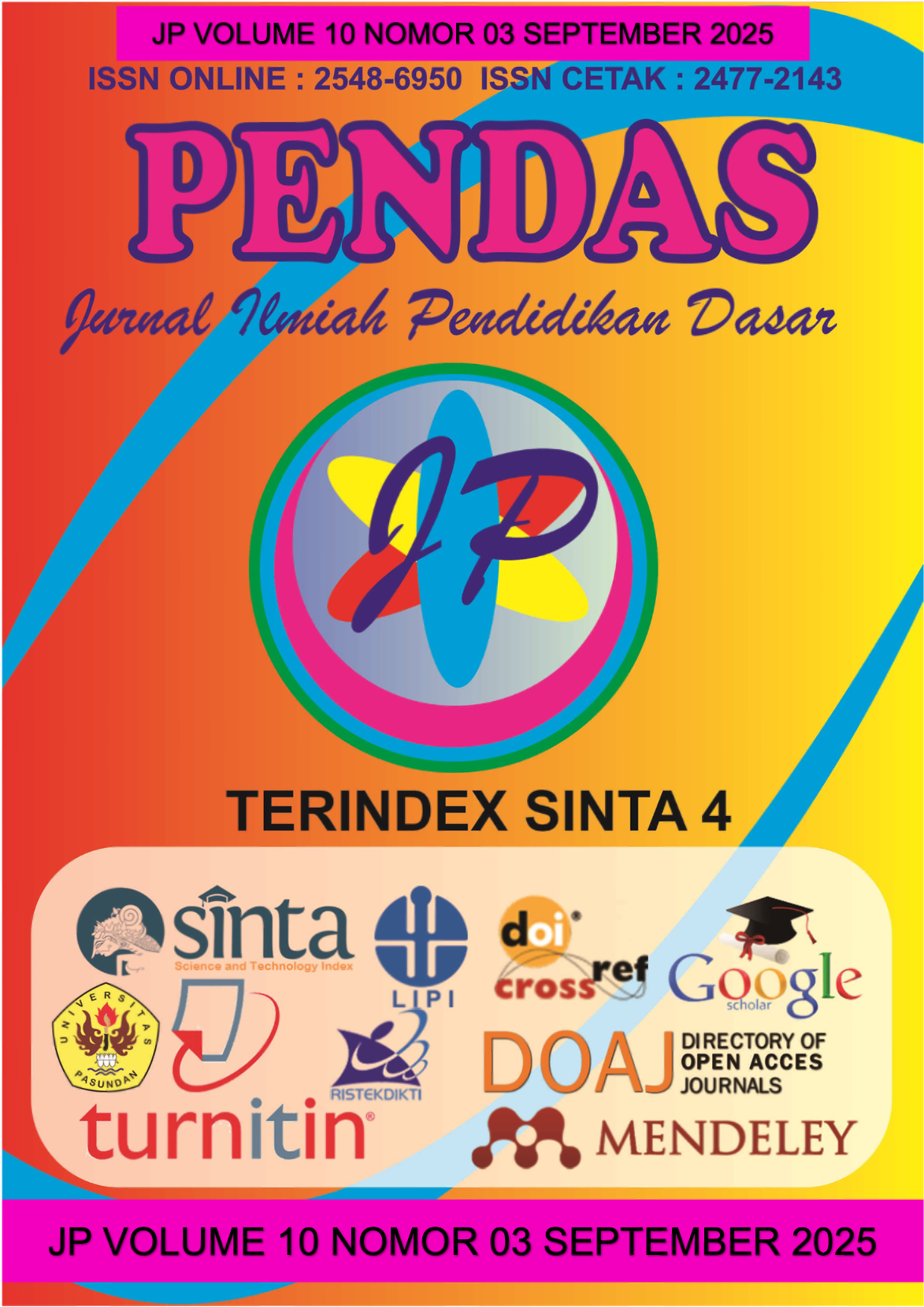DESIGN AND IMPLEMENTATION OF AN EDUCATIONAL QUIZ TO PROMOTE RELIGIOUS MODERATION AMONG PRIMARY SCHOOL STUDENTS
DOI:
https://doi.org/10.23969/jp.v10i03.33525Keywords:
Religious moderation, Educational quiz, Tolerance, Game-based learning, Multicultural educationAbstract
This study explores the design and implementation of an educational quiz aimed at promoting religious moderation among primary school students. The quiz, consisting of 50 multiple-choice questions across five thematic areas—tolerance and respect for differences, peaceful coexistence, anti-violence, love for the nation and diversity, and friendship and togetherness—was implemented with students in grades 3 to 6 at MI Ma’arif NU 1 Kracak, Cilacap. The study employed a quasi-experimental design with pre- and post-test assessments to evaluate changes in students' knowledge, attitudes, and behaviors. Classroom observations and student reflections were also used to gain deeper insights into the impact of the quiz. The results indicate a significant increase in students’ knowledge of religious moderation after participating in the quiz, as well as positive changes in attitudes and behaviors related to tolerance, empathy, and respect for diversity. The interactive features of the quiz, including immediate feedback and friendly competition, were found to enhance student engagement and motivation. Teachers reported that the quiz encouraged open discussions about sensitive topics, such as interfaith relations and cultural diversity, fostering a more inclusive classroom environment. The findings suggest that game-based learning, particularly through interactive quizzes, can be a powerful tool for instilling values of tolerance and social harmony in primary education. This study highlights the potential of integrating quiz-based interventions into school curricula to promote religious moderation and prepare students for life in multicultural societies. Future research is recommended to explore the long-term impact of such interventions and examine their scalability across different educational contexts.
Downloads
References
Bela, R., & Suyadi, D. (2024). Permainan Interaktif Sebagai Media Pembelajaran pada Anak Usia Dini. Jurnal Edukasia, 5(1), 112-125. https://jurnaledukasia.org/index.php/edukasia/article/view/1169
Bunyamin, M., & Elly, R. (2023). Konsep sekolah damai: Harmonisasi profil pelajar Pancasila dalam implementasi kurikulum merdeka belajar. Jurnal Pendidikan dan Sosial Budaya, 7(2), 31-43. https://pdfs.semanticscholar.org/2f08/b6d62df5fa54fae0368165829418c36faff0.pdf
Candra, P. (2023). Analisis Etika Pendidikan Implementasi Nilai-nilai Filosofis dalam Kurikulum Global. Literature Note Journal, 12(3), 56-71. http://liternote.com/index.php/ln/article/view/24
Diah, N. A., & Hasrian, H. (2023). Pendidikan agama Islam sebagai sarana membentuk identitas keagamaan dalam masyarakat multikultural. Journal of Education and Learning Research, 5(1), 91-102. https://www.pusdikra-publishing.com/index.php/jelr/article/view/1554
Glickman, M. C. (2018). Handbook of research on educational communications and technology. Springer.
Hattie, J., & Timperley, H. (2007). The power of feedback. Review of Educational Research, 77(1), 81-112. https://doi.org/10.3102/003465430298487
Johnson, D. W., & Johnson, R. T. (2009). Cooperation and the use of technology. In M. C. Glickman (Ed.), Handbook of research on educational communications and technology (pp. 641-650). Springer. https://doi.org/10.1007/978-1-4419-5684-5_74
Krenare, R., Rabail, A., Alf, H., & Ali, S. (2021). Game-based digital quiz as a tool for improving students’ engagement and learning in online lectures. IEEE Access, 9, 87692-87704. https://ieeexplore.ieee.org/abstract/document/9452076/
Ladson-Billings, G. (1994). The dreamkeepers: Successful teachers of African American children. Jossey-Bass.
Malau, T. (2024). Dialog antaragama dan kontribusi tokoh agama dalam penyelesaian konflik dan implementasinya untuk memperkuat toleransi. Magistra Jurnal Pendidikan, 5(2), 124-135. https://ejurnal.stpdianmandala.ac.id/index.php/magistra/article/view/70
Koutrouba, K., & Theodoridou, A. (2019). The effectiveness of game-based learning: A meta-analysis of recent studies. Educational Psychology Review, 31(4), 731-755. https://doi.org/10.1007/s10648-019-09422-0
QuillBot. (2025). QuillBot Flow. (Sep 2025 version) [Large Language Model]. Retrieved September 14, 2025, from https://quillbot.com/flow
Rika, E., Enan, S., & Dede, R. (2023). Penanaman nilai-nilai toleransi pada anak usia dini di TK Sejahtera Citeko Kecamatan Plered. Pandu Jurnal Pendidikan, 12(4), 212-225. https://jurnal.kalimasadagroup.com/index.php/pandu/article/view/65
Rusmiati, R. (2023). Penanaman nilai-nilai toleransi pada anak usia dini. Abdi Moestopo Journal, 11(3), 88-98. https://journal1.moestopo.ac.id/index.php/abdimoestopo/article/view/3077
S., D., Muh, R., & Retno, A. (2023). Permainan Edukatif dalam Pembelajaran Bahasa Inggris untuk Siswa Sekolah Dasar. Attractive Journal, 9(2), 45-58. https://attractivejournal.com/index.php/aj/article/view/845
Sumomba, A. (2024). Pengembangan Kuis Interaktif Berbasis Game Edukatif Pada Mata Pelajaran Bahasa Inggris Kelas VII Di DDI Alliritengae Maros. Eprints UNM, 35(4), 123-136. https://eprints.unm.ac.id/35853/
Vygotsky, L. S. (1978). Mind in society: The development of higher psychological processes. Harvard University Press.
Wang, M., & Li, X. (2021). The effects of game-based learning on students’ academic performance and motivation: A meta-analysis. Educational Psychology Review, 33(2), 287-320. https://doi.org/10.1007/s10648-020-09503-7
Yuliana, F., & Fitria, D. (2023). The impact of interactive learning media on students’ engagement in multicultural education: Case study in Indonesia. International Journal of Educational Technology, 8(1), 14-28. https://ejournal.universityid.ac.id/ijetc/article/view/1012
Zohar, A., & Dori, Y. J. (2022). Enhancing students’ understanding of science concepts through game-based learning and formative assessment. Journal of Research in Science Teaching, 59(6), 911-934. https://doi.org/10.1002/tea.21772
Downloads
Published
Issue
Section
License
Copyright (c) 2025 Pendas : Jurnal Ilmiah Pendidikan Dasar

This work is licensed under a Creative Commons Attribution 4.0 International License.














































